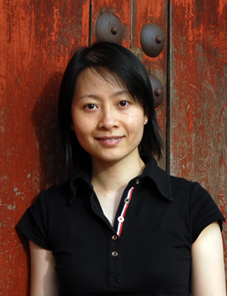Exemplary Teaching Award in General Education 2010
Time: 4:30-5:30pm
Venue: Staff/Student Centre of Leung Hung Kee Building, New Asia College, CUHK
In 2010, seven teachers were nominated for the Award and the Exemplary Teaching Awards in General Education go to Prof. Wan Chui Ki Maggie, Assistant Professor of Department of Fine Arts.
Prof. Wan Chui Ki Maggie

especially with limited class time, depends on whether the teacher can instill curiosity in students so that they will embark on a lifelong quest for knowledge.'
Prof. Wan Chui Ki Maggie graduated with a BA in Fine Arts from the Chinese University of Hong Kong and obtained her Master of Arts from the School of Oriental and African Studies, University of London. Prof. Wan received in 2006 her D.Phil. in History of Chinese Art from Oxford University. She taught at the City University of Hong Kong before joining the Department of Fine Arts at CUHK in 2007. Her research interests include ceramic art and Daoist art from Song Dynasty to Qing Dynasty.


Prof. Wan, an alumnus of New Asia College, has taught a number of general education courses offered by the College, including ‘Student-oriented Teaching and Seminar’ (GENA 1113), ‘Appreciation of Art’ (GENA 2152) and ‘Appreciation of Chinese Art’ (GENA 2262). Since 2010 she has also taught the University General Education course ‘Religious Art of China’ (UGED 2306).
In ‘Appreciation of Art’ (GENA 2152) Prof. Wan uses masterpieces from Chinese and Western traditions, such as Mona Lisa and Along the River during the Qingming Festival, to provide entry points for students into the historical and cultural contexts that shape artists and their works, and to show how the form and content of a work express an artist’s visions of self, history and the world. Seeing both Chinese and Western traditions as constituent components of the human heritage, Prof. Wan is convinced of her vocation and responsibility to inspire students to approach art from different perspectives. Using Marcel Duchamp’s Fountain as an example, she also stresses that art can provide not only visual pleasure but also cultural critique.


In ‘Appreciation of Chinese Art’ (GENA 2262) Prof. Wan focuses on the diversity of Chinese art by introducing students to the many forms it has taken since prehistoric times, e.g. clay, jade, gold and lacquered objects that are intimately related to the aesthetics, outlook and material life of the Chinese people. To counteract Hong Kong students’ general lack of familiarity with Chinese art, Prof. Wan encourages students to relate art to life experience and think about how a book, a painting, a porcelain, a tile, a bracelet or a pendant can play a part in the development of Chinese art and culture. Prof. Wan believes that students can gain a deep understanding only by analyzing and discussing the object of study. Hence, she encourages students to ask and answer questions about the art objects she shown in class. A term paper is also required for this reason.
‘Religious Art of China’ (UGED 2306), which covers pre-Qin religious belief, Daoism and Buddhism, is thematically organized into three parts: ‘Tomb and Conception of Death’, ‘Buddhist Art’ and ‘Daoist Art’. Prof. Wan aims to give students a toolkit for understanding Chinese views concerning the universe, god, ghost, life, death and immortality as expressed in different times through paintings, buildings, sculptures and ritual objects. This course is designed not to give students a definite answer about afterlife, but rather to set students thinking about, among others, the question why people in ancient times committed huge manpower and resources to the creation of tombs and burial treasures.
Prof. Wan believes that, in this age of information, facts will be quickly forgotten and only those things we find meaningful and relevant will remain etched in the mind, and that success in teaching a general education course, especially with limited class time, depends on whether the teacher can instill curiosity in students so that they will embark on a lifelong quest for knowledge. Prof. Wan especially enjoys teaching ‘Student-oriented Teaching and Seminar’ (GENA 1113), which provides a learning platform for students from different backgrounds to work on group projects, share findings and receive feedback in a relaxed but stimulating atmosphere that allows differences and promotes understanding. Which is to say general education and art education share the same spirit of broadmindedness combined with discrimination.

